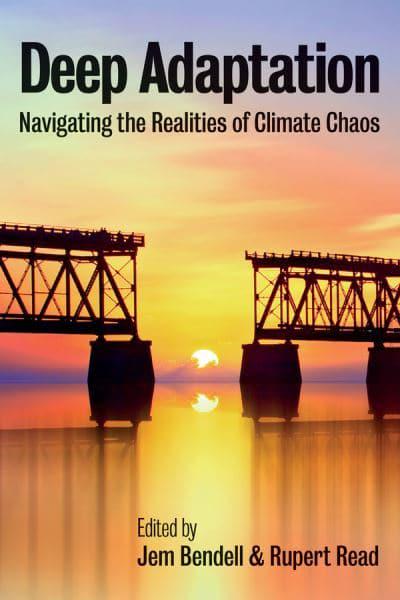Deep crisis: Deep adaptation… | Polity – Bloghttps://politybooks.com/deep-crisis-deep-adaptation/https://www.wiley.com/en-cz/Deep+Adaptation%3A+Navigating+the+Realities+of+Climate+Chaos-p-9781509546855As we begin to emerge from a dark period of history dominated by the devastating Covid pandemic, many of us are therefore taking this opportunity to reassess things we previously took for granted: What parts of society really matters? How important is stuff? Love? Life itself? How should we work? How can we respond to future challenges? It is due to this new moment of reflection and re-consideration that I don’t think there could have been a more fitting time to release Deep Adaptation: Navigating the Realities of Climate Chaos, the new book I have co-authored with the originator of the deep adaptation concept, Jem Bendell. This will be the first book on the controversial subject of Deep Adaptation, and will advance from Bendell’s 2018 article “Deep Adaptation: A Map for Navigating Climate Tragedy” which has been downloaded more than a million times.
Deep adaptation is an emerging philosophical and social movement that is concerned with how to prepare ourselves to minimise the damage of the potential (and increasingly likely) social, political, and environmental collapse the future threatens us with. As I see it, it by no means constitutes us giving up on trying preventing these calamities, but it is a reasonable and necessary philosophical and practical exercise to undergo when we are honest with ourselves about the pretty desperate situation we are in.
2021 is a critical year in the future of the human race, and one that we are now almost halfway through. If the post-Covid ‘reset’ is not green, if it does not seriously confront the challenges and take swift measures to curtail the worst of pollution, emissions, and environmental destruction, then we accelerate toward collapse. With this in mind, how do we begin to talk to each other, reorganise communities, and learn to live under the shadow of the all-too-realistic possibility of societal collapse? This is quickly becoming one of the most important questions to ask, and humanity must come up with an answer. The conversation that our book attempts to spark is one that will deal with these issues head-on.
Deep Adaptation is a growing school of thought, and the idea of adaptation is creeping steadily up the international agenda (it is a headline item at the autumn’s COP, for the first time ever). Despite this, it is still being taken nowhere near as seriously as ‘mitigation’/prevention. Why?: because once we start talking about or even doing adaptation, we can no longer deny how bad the situation is. And that is what most people are still uncomfortable doing. This failure to engage seriously with adaptation, let alone deep adaptation, risks being a form of tacit/soft climate-denial in action.
Let me be frank: It’s time to prepare for the worst. But that is because, if we don’t prepare for the worst, we could get burnt the worst. I’m not giving up on the fight to stop our society undermining its own future existence, far from it! On the contrary, when I contemplate the likelihood of collapse, and the need therefore for deep adaptation, it makes me all the more determined to try to stop collapse, even if the chances of succeeding in doing so seem slim. But: not being willing to be honest enough to contemplate it isn’t going to help us.
...
This book is systems-thinking for our time. It opens up a space for a debate that has been avoided for too long. We hope deeply that you will take up the invitation it offers.
